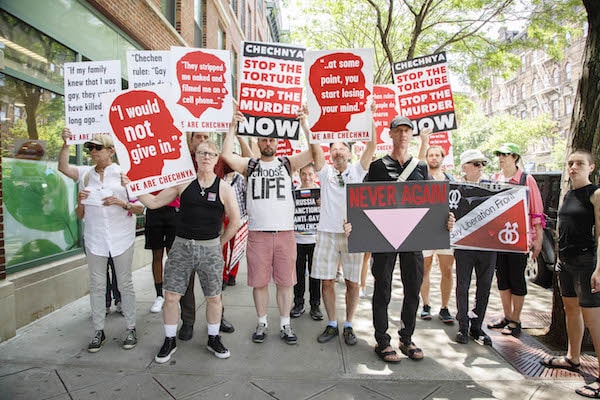By Abigail Edwards
The world was shocked when on the night of June 12, 2016 the Pulse nightclub in Orlando, Florida was the site of one of the deadliest mass shootings in U.S. history, targeting the LGBTQ+ community. In a call to the police during the shooting, Omar Mateen pledged his allegiance to the militant jihadist group Islamic State of Iraq and the Levant, identifying himself as “Mujahid”, “Islamic Soldier”, and “Soldier of God.”
For years, the media has largely portrayed LGBTQ+ issues through a western perspective: the Stonewall riots in 1969; the fight for the right to marry in western European countries, Canada, and finally the United States; colorful Pride marches; discrimination against gays in the marketplace; for example.
The threats posed to the LGBTQ+ community in the West are major, but recent crackdowns in Chechnya, Egypt, Azerbaijan, and Indonesia, among other places, highlight the fact that this issue is global and, even more so, religious.
In Chechnya, in the mountainous Caucasus region of southern Russia, Islam dominates under the rule of the region’s leader Ramzan Kadyrov, a once separatist, who Russian President Vladimir Putin has allowed to impose traditional Sufi Islam rule in exchange for cooperation with the Kremlin. Since late March, this region has witnessed the systematic disappearance of hundreds of gay men who were targeted through dating websites by government officials creating profiles, posing as men using these sites. Often a meetup was arranged, at which point the target was captured and taken to a makeshift prison set up in an abandoned building where they were beaten and often tortured with electricity while interrogated, pushed to reveal names of other gays.
In this highly Islamic region, where members of the LGBTQ+ community can only really meet online, and are forced to hide their identities behind pseudonyms, the anti-gay crackdowns were easily denied by the Chechen government. Kadyrov denied that gay people existed at all in the republic and thus could not be detained.
Heda Saratova, the Chechen human rights representative, when confronted about the disappearances, replied, “I never saw them with my own eyes, and I never heard of them. I never thought of them. In my 50 years, I have never seen a gay man. I see flies, I see mosquitoes, but I have never seen a gay man.”
These crackdowns, while started by the government, were greatly aided by the norms of Chechen society, which strongly condemn homosexuality and “non-traditional sexual orientation” as a sin. Within Chechnya, Kadyrov has been successful in creating a society based on Sufi-Islamic traditionalism, enforced through collective punishment. For many, the crackdowns were impersonal; they believed they knew no gays. But even when those who had disappeared were released to their relatives and outed as gay, many were killed by their own families in “honor killings” to preserve their social integrity.
In Egypt, a country dominated by Islam, over 50 people were arrested as of mid-October based on assumed sexual orientation or gender identity. Similar to Chechnya, victims were often trapped on dating websites and online chat rooms.
The widespread crackdown in Egypt began after the concert of a Lebanese band whose lead singer is gay. During the concert, two people were arrested for waving rainbow flags. The two were detained under charges including “joining an outlawed group that aims to promote homosexuality.”
In Egypt as well, the crackdowns have been aided by a complicit society. One of the most influential Egyptian talk show hosts, Ahmed Moussa, suggested in an interview that the concert flag bearers were “trying to ‘disgrace’ Egypt by making it appear to accept homosexuality.”
“I am warning you against calling this a matter of personal freedom!” he told viewers. “This is about religions! This is about morals!”
A similar situation erupted in Baku, the capital of Azerbaijan, where over 80 people identified in the LGBTQ+ community have been detained, beaten, tortured using electric shocks and forced shaving, and put through additional humiliation such as medical examinations with results that were released to the media.
Since the Chechen disappearances that began in March, the United Nations has been swift in condemning the systematic LGBTQ+ crackdowns, in particular the abductions and killings in Chechnya and the intrusive medical examinations that took place in Egypt. In June, twelve UN agencies called for an end to “discrimination in health care and the elimination of laws that criminalize gender expression and relationships between consenting adults,” arguing that such measures were an obstacle to development goals, and violated basic human rights. Furthermore, Canada quietly took a step forward in aiding gays and lesbians from the Chechen crisis, allowing them expedited entry into Canada as government-assisted refugees.
It is important to note that while the major religious threats to the LGBTQ+ community in 2017 have come from extremist Islamist communities, the issue between LGBTQ+ rights and religion is by no means limited to Islam. In the West particularly, the biggest threat to this group has been radical Christian sects such as the infamous Westboro Baptist Church. Furthermore, Pope Francis and many other western leaders have proven that religion and LGBTQ+ recognition and rights are not incompatible. However, as the crackdowns in Chechnya, Egypt, and Azerbaijan have shown, this is not yet true in the majority of the world’s countries.
Photo: Christian Miles//Gay City News
Other posts that may interest you:
- The Trouble with ‘Ecocide’
- Carbon dioxide removal – hit or miss?
- Local Victories for Turkish Opposition — A Sign of Hope?
- Are France and Japan a Mismatch Made in Heaven?
- A Reflection on Dark Tourism
Discover more from The Sundial Press
Subscribe to get the latest posts sent to your email.





